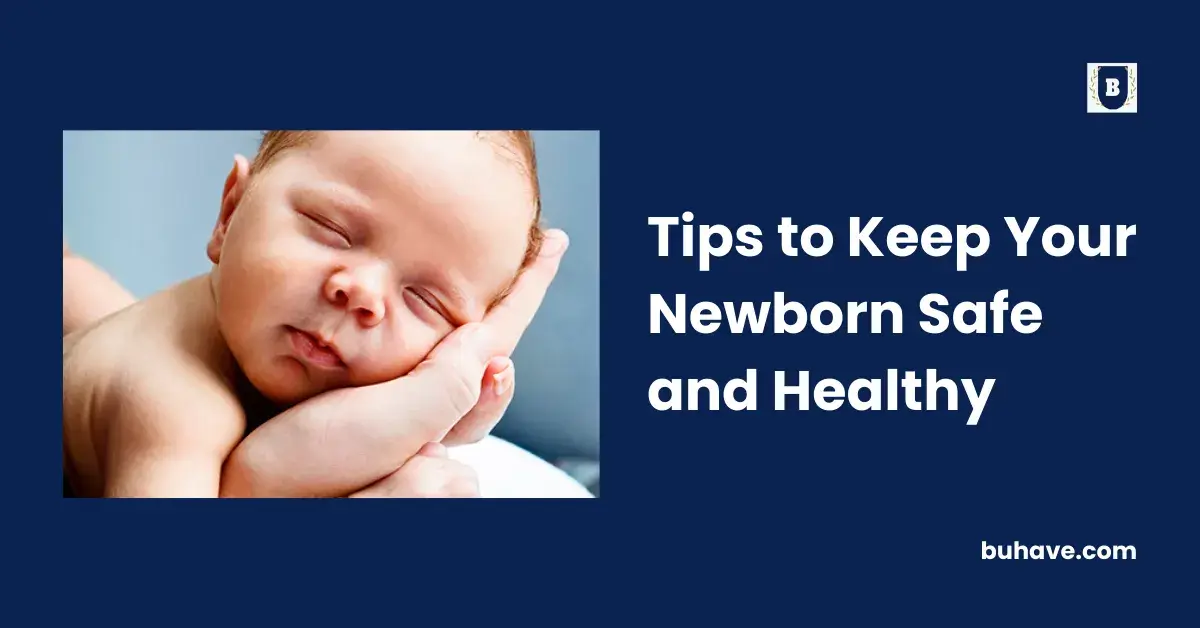Welcoming a newborn can be one of the most amazing experiences of one’s life. Taking care of a newborn can also be difficult, particularly for first-time parents. A newborn’s immune system is still developing, making them more susceptible to illnesses and infections because they are sensitive and vulnerable. As a result, keeping your newborn safe and healthy is a top priority.
Here are some tips to keep your child safe and healthy.
Feeding Your Newborn
Proper nutrition is crucial for the healthy growth and development of your newborn. Breast milk is the best food for your baby, as it provides all the nutrients your baby needs in the right amounts. Breastfeeding also has numerous benefits, including boosting your baby’s immune system, reducing the risk of infections, and improving brain development. If you are unable to breastfeed, formula feeding is a suitable alternative.
Feeding Your Baby
Proper nutrition is essential for your baby’s healthy growth and development. Breast milk is the best food for your newborn, as it provides all the essential nutrients your baby needs in the right proportion. Also, breastfeeding has countless benefits, such as enhancing brain development, lowering the chances of infection, and improving brain development. If you are unable to breastfeed, infant feeding formula is a suitable alternative.
Sleeping Position
It is important to ensure that your child’s sleeping surface is firm and level, with no extra soft bedding, pillows, or toys that could pose a suffocation risk. For the first six months, you might want to think about putting your baby in a bassinet or crib in the same room as you to minimize the risk of sudden infant death syndrome (SIDS).
Bath a Newborn
Until the umbilical cord stump falls off, newborns do not need to be bathed every day. Instead, they can be given sponge baths. After the umbilical line stump falls off, you can start showering your child a few times each week. Avoid getting water in your baby’s eyes or ears by using warm water and mild soap that does not contain any fragrance. Before beginning the bath, check that the room is warm and that you have all the necessary supplies within your reach.
Diapering Your Newborn and Caring for Diaper Rash
It is essential to change your baby’s diaper frequently to maintain their comfort and prevent diaper rash. Babies can go through up to ten diapers every day. If necessary, apply a mild, fragrance-free diaper rash cream. To prevent infections, wipe your baby from head to toe and make sure to clean all the folds and creases.
Dressing and Temperature Control
Newborns cannot regulate their body temperature, it is essential to outfit them properly for the weather. Make sure your baby’s head is covered and is dressed in layers that can be changed quickly. Dress your baby in one more layer than you are wearing. Don’t over or under-dress your baby.
Social Interaction
Newborns thrive when they interact with others, so it’s important to hold, cuddle, and talk to them. As long as no one is ill, invite friends and family to visit. Limit guests if important, to prevent overstimulation and minimize the risk of infections.
Newborn Immunizations
Immunizations are very important for keeping your baby safe from illnesses that could kill them. For newborns, the Centers for Disease Control and Prevention (CDC) recommends a specific vaccination schedule that begins shortly after birth with the first dose of the hepatitis B vaccine. Make sure your baby is up to date on all of their vaccines by consulting your pediatrician.
Monitoring Your Newborn
Newborns are unable to tell us when something is wrong, it is essential to closely monitor them for symptoms of illness. Keep an eye on your infant’s temperature regularly and look for symptoms of a fever, such as a lack of energy. Look for symptoms of illness like nausea, vomiting, or trouble breathing. If you notice anything, consult your pediatrician.
One of the best ways to keep your baby safe is to build a relationship with a pediatrician. A pediatrician is a clinical specialist who specializes in the care of infants, children, and adolescents. Choosing an experienced pediatrician is the right choice. It’s vital to find a Pediatrician in Boise who you feel comfortable with and who shares your nurturing philosophy. Take into consideration their expertise, availability, and location.
Becoming a new parent can be overwhelming. To help you in overcoming the difficulties of parenthood, a pediatrician can offer you valuable support and direction. From overcoming sleep deprivation to dealing with common behavioral issues, they can offer the right guidance.
Final thoughts
If you want to keep your newborn safe and healthy, a pediatrician can be a perfect choice. A pediatrician can give you the right information and support you need to give your baby the best possible start in life, from keeping an eye on how he or she grows to give you advice on how to feed, sleep, and stay safe. Feel free to consult your pediatrician if you have any worries about your baby’s health.

